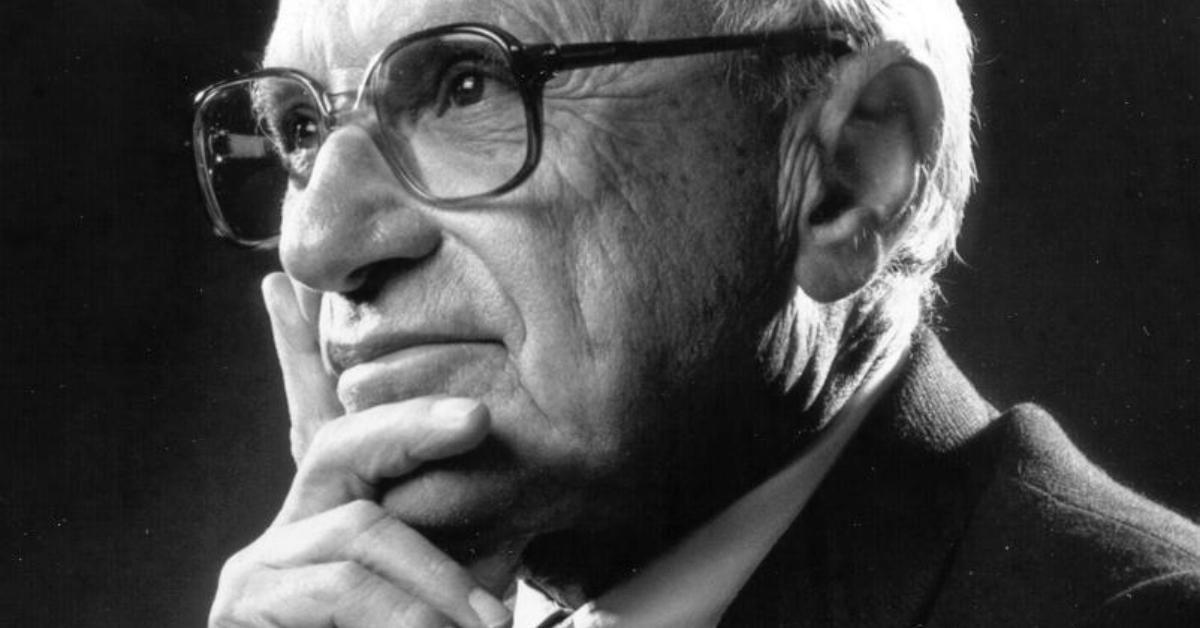
When we think of Milton Friedman and Murray Rothbard, what come to mind first are their contrary views on economics, but I’d like to discuss a different subject that might surprise some of my readers because they don’t associate Friedman with positions on it: American foreign policy. Jennifer Burns’s outstanding new biography Milton Friedman: The Last Conservative (Farrar, Straus and Giroux, 2023) enables us to grasp more fully the differences between the foreign-policy views of Friedman and Rothbard, who unfortunately is not mentioned at all in the book.
Friedman strongly favored America’s entry into World War II, backed the Cold War, and egged William F. Buckley Jr. on to purge isolationists and “extremists” from the ranks of the Right.
Friedman secured his first academic job in 1940, a temporary appointment at the University of Wisconsin. He did not get along with most of his colleagues in the department. As Burns explains, “Still home to generations of German immigrants and their descendants, Wisconsin was isolationist and even pro-German, whereas Friedman made no secret of his desire for intervening in the war in Europe. ‘Around here, I am a real warmonger,’ he reported to Arthur Burns.”
Burns notes that after the war, Friedman continued to support an activist American foreign policy:
Friedman’s support for a robust U.S. presence in Europe was widely held among moderate Republicans and helped motivate the 1952 candidacy of Dwight Eisenhower. Courted by both parties, the popular general was worried that a [Robert] Taft presidency would undo the victories of World War II. He would eventually run as a Republican, enraging Taft’s grassroots supporters. Sharing Eisenhower’s global outlook, and alert to dangerous currents on the American right, Friedman supported his candidacy.
Among these dangerous currents, Friedman found especially disturbing Senator Joseph McCarthy’s battle against Communists and their sympathizers. Burns notes that in correspondence with Fritz Machlup, who voted for the Democrat Adlai Stevenson in the 1952 election because he “saw in McCarthy the second coming of Nazism,” Friedman asserted that Eisenhower would be better able than Stevenson to clamp down on McCarthy:
Friedman argued that, bad as McCarthy was, he would be better contained by a Republican administration. “Extremists are always far more potent when their party is out of power than when it is power,” he wrote . . . Friedman argued that the greater danger was that an Eisenhower defeat would embolden McCarthyites and weaken moderate Republicanism: “They will be able to say that 4 times now the me-tooers + internationalist wing of the party has led them down to defeat.” The triumph of this extreme wing of the party, which Friedman identified with both McCarthy and the Chicago Tribune, would be an “unmitigated disaster.”
Murray Rothbard, by contrast, supported a noninterventionist foreign policy and allied with the Old Right. He opposed the Cold War and supported McCarthy. Professor Joseph Salerno explains:
I was enlightened on this matter by Murray Rothbard’s analysis of the Joe McCarthy phenomenon of the early 1950s. Rothbard delighted in standing the established view of McCarthy on its head.
The entire political and academic establishment, from New Deal/Truman Democrats to Eisenhower Republicans, from moderate liberals to moderate conservatives, concurred in the necessity of waging a Cold War to contain the alleged Soviet conspiracy to take over the so-called Free World and therefore were in explicit agreement with McCarthy’s ultimate goals. What they detested, they said, was McCarthy’s means.
Rothbard, in sharp contrast, never believed that the Soviet Union, albeit a bloody and repressive dictatorship, had the ability or intention of taking over the West. Rather, he argued that the Cold War was a ruse devised by the American ruling elite to justify the continuation and expansion of the massive, tax-consuming, welfare-warfare state built up during World War II at home and to rationalize postwar US imperialist ambitions for assorted military interventions abroad. While dismissing McCarthy’s ridiculous and contrived Cold War ideology—which, to repeat, he shared with most of his respectable establishment detractors—Rothbard had a profound appreciation for the means McCarthy employed. According to Rothbard,
The unique and glorious thing about McCarthy was not his goals or his ideology, but precisely his radical, populist means. For McCarthy was able, for a few years, to short-circuit the intense opposition of all the elites in American life: from the Eisenhower-Rockefeller administration to the Pentagon and the military-industrial complex to liberal and left media and academic elites—to overcome all that opposition and reach and inspire the masses directly. And he did it through television, and without any real movement behind him; he had only a guerrilla band of a few advisers, but no organization and no infrastructure.
The rise of the American Right in the 1960s did not entirely please Friedman because it included people whose views he strongly opposed. “Looking across this new landscape,” Burns says, “Friedman saw at least three types of conservatives; libertarians, traditional conservatives, and ‘crackpot conservatives of the radical right fringe.’ Friedman considered himself to have little in common with the latter group.”
When Buckley battled against the John Birch Society, which, unlike the Cold Warriors, saw the struggle against communism as internal rather than external, Friedman joined forces with him because Buckley supported both the free market and an interventionist foreign policy. Friedman didn’t “warm to the young upstart right away,” but
relations [between Friedman and Buckley] thawed as Buckley mounted a public campaign against the John Birch Society, publishing disapproving editorials in 1961 and 1962 . . . Friedman soon appeared helpful in this cause. Buckley solicited (unsuccessfully) a paper on foreign aid for National Review, and in turn Friedman congratulated his recent sallies against [Robert] Welch [the founder of the society]. The struggle against Welch marked a new and critical phase in the evolution of conservatism from intellectual pet project to coming political force. In earlier days, Friedman had gone up against the likes of Ludwig von Mises on an isolated European mountaintop. Now the battle to define conservatism played out on a much larger landscape, and the stakes were far higher.
Rothbard, to say the least, didn’t agree with Buckley’s purges:
And so the purges began. One after another, Buckley and National Review purged and excommunicated all the radicals, all the non-respectables. Consider the roll-call: isolationists (such as John T. Flynn), anti-Zionists, libertarians, Ayn Randians, the John Birch Society, and all those who continued, like the early National Review, to dare to oppose Martin Luther King and the civil rights revolution after Buckley had changed and decided to embrace it.
Who was right—Friedman or Rothbard? I do not think most readers will find it difficult to answer.





